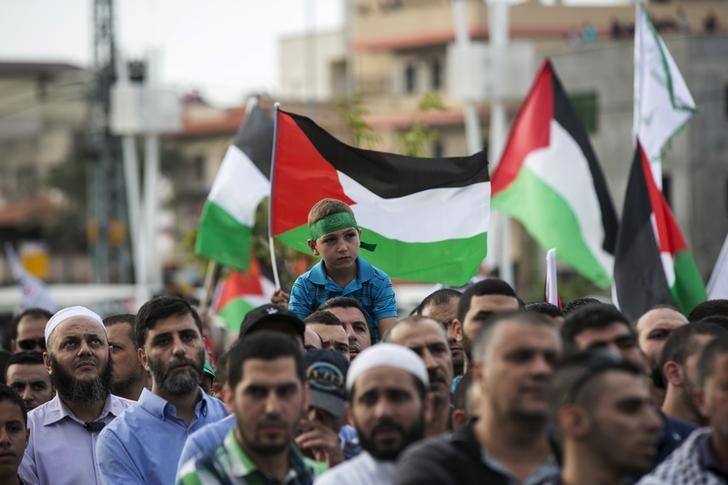By Jeffrey Heller
JERUSALEM (Reuters) - Nearly half of Israeli Jews believe Arabs should be expelled or transferred from Israel, according to a survey on the political views of Jewish religious and secular communities.
The poll released on Tuesday by the Washington-based Pew Research Center, a non-partisan think tank, also found that many Israelis - Jews and Arabs - appeared to have lost hope for a two-state solution to the Israeli-Palestinian conflict.
Forty-eight percent of Israeli Jews said they agreed with the statement that Arabs should be expelled or transferred from Israel, where they make up 19 percent of the population of 8.4 million.
While 54 to 71 percent of Jews who defined themselves as ultra-Orthodox, religious or "traditional" supported such a step, only about 36 percent of the secular community did.
President Reuven Rivlin called the findings a "wake-up call for Israeli society".
The survey also addressed the role of religion in a modern-day democracy founded as a Jewish state, exposing wide gaps between Orthodox and non-religious Jewish respondents.
According to the poll, 89 percent of Israel's secular Jews want democratic principles to outweigh Jewish ritual law when the two clash. An identical percentage of ultra-Orthodox Jews take the opposite view.
In addition, about 8 in 10 Arabs complained of heavy discrimination in Israeli society against Muslims, the largest religious minority, while 79 percent of Jews questioned said Jewish citizens deserved preferential treatment.
"It pains me to see the gap that exists in the public's consciousness - religious and secular - between the notion of Israel as a Jewish state and as a democratic state," Rivlin said in a statement after receiving the report. "A further problem is the attitude towards Israel's Arab citizens."
In the poll, 9 percent of Jews identified themselves as ultra-Orthodox, 13 percent as religious, 29 percent as 'traditional' and 49 percent as secular.
It found devout Jews largely lean to the right politically, while secular Jews mainly see themselves as centrists.
Among the many divides on social and religious issues, the vast majority of ultra-Orthodox and religious Jews supported a long-standing shutdown of most public transportation on the Jewish Sabbath, while 94 percent of secular Jews took the opposite view.
Most secular Jews saw themselves as "Israelis first", while 91 percent of ultra-Orthodox and 80 percent of religious Jews in general said they were "Jews first".
About 40 percent of Israeli Jews believe a way can be found for Israel to co-exist with a future Palestine, while a similar percentage believe this is not possible, according to the poll.
Among the Arab population, about half saw such co-existence as possible, compared with 74 percent in 2013.
Israeli-Palestinian peace talks collapsed in 2014, just before a seven-week war between Israel and Palestinian armed groups in Gaza.

The researchers conducted 5,601 face-to-face interviews with 3,789 Jews, 871 Muslims, 468 Christians and 439 Druze in Israel from October 2014 to May 2015.